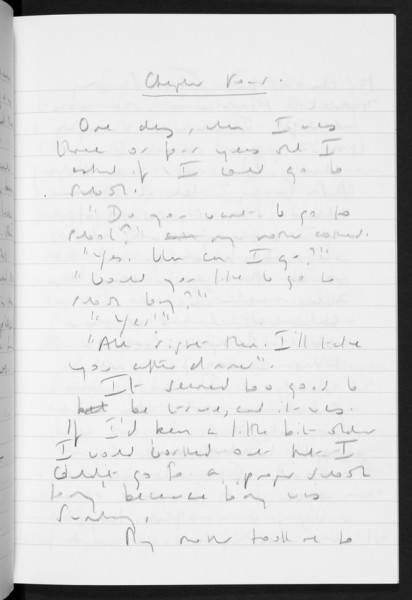The fact that the British Library purchased the archive of poet Wendy Cope (yes, that Wendy Cope) is not all that unusual. Keeping a record of the development of its poets is part of its mission. (I saw a draft of Wilfred Owen’s “Anthem for Doomed Youth” with Siegfried Sasson’s notes on it at the BL!) The unusual aspect is the predominance of email.

“‘Retrieved from the cloud,’ the collection of approximately 40,000 emails dating from 2004 to the present,” the Library said in a statement, “is the most substantial in a literary archive acquired by the British Library to date, affording among other things a fascinating and extensive insight into writerly networks.”
This is not an email.

The acquisition cost the Library just under $53,000. They have wrapped it in a multimedia presentation, “as part of a wider programme of enhanced curatorial activities.” This included a “panoramic digital photograph of Cope’s study and an interview recorded on the day the material was collected, in which she reflects on her archive and the writing life it represents, will allow researchers to reconstruct a retrospective context for the physical and electronic records acquired, as well as recording for posterity the space which informed the creative process.”
These sorts of issues – what to collect and how to contextualize the collections – have always been big in archival circles. The electronic elements are just another turning in archivists’ relationship to the materials.
This is not the first time poet’s emails have been collected, but it seems to be, by far, the largest such collection. As more media is used by poets to correspond, take notes, make drafts and float ideas, the collections will grow. Already, Twitter, blogs, social networks and searches are no doubt growing on the hard-drives, thumb-drives and clouds that surround contemporary poets.
You have to wonder though about the sense of poetic presence that a physical medium allows. When you see a poets marginalia in a book of, say, Dickinson poems, there is a sense of “I am where she was.” Can that be communicated with electronic media?
Listen to Cope reading several of her poems, “Strugnel’s Haikus,” “Flowers,” “The Christmas Life” and “On a Train.”
Page image from the British Library | other sources: The Chronicle of Higher Education










